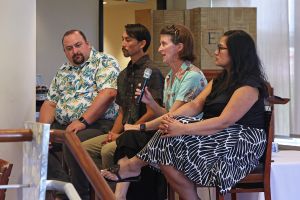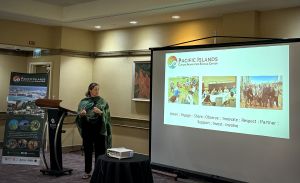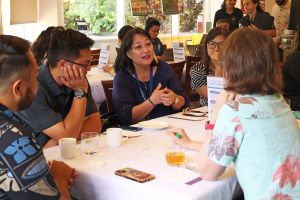PI-CASC hosts NCA 5 workshop, climate science sessions at 15th UOG Conference on Island Sustainability

Climate adaptation science, resources, and discussions were out in full force during the 15th University of Guam (UOG) Conference on Island Sustainability (CIS), with several activities coordinated by the Pacific Islands Climate Adaptation Science Center (PI-CASC).
PI-CASC was a sponsor for the annual conference, held from April 8 to 13 at the Hyatt Regency Guam. The theme, “Sustainability Endures,” focused on sustainable and climate-resilient actions that Pacific Islands has taken since the conference’s inception.
On April 9, PI-CASC coordinated a public engagement workshop for Fifth National Climate Assessment’s (NCA 5) chapter on Hawaiʻi and the U.S.-affiliated Pacific Islands (USAPI). The center also hosted two breakout sessions on April 12 and 13, with a series of presentations that demonstrated management plans and educational resources targeting climate change impacts.
“PI-CASC is proud to support one of UOG’s biggest annual conferences, especially one that highlights applied science that can assist managers to make our island more resilient to the compound impacts of climate change. As a consortium member of PI-CASC, we will continue to share with UOG, the government of Guam, and the community any available resources and expertise to encourage adaptation within our island community,” said UOG PI-CASC Lead Dr. Romina King.
NCA 5 Workshop
Public officials, natural resource managers, and members of the public were invited to provide feedback and insight on the NCA 5’s report on our region. The assessment, which was released in November 2023, shared five key messages underlining the islands’ areas of concerns on food systems and clean water, public health, sea level rise and the built environment, natural resources and biodiversity, and indigenous knowledge systems.
NCA Chief of Staff Dr. Chris Avery opened the workshop with a message about how underserved communities, which are among the most vulnerable to climate change impacts, are often not included or considered in nationwide reports. Avery said that this significant data gap was acknowledged during the processes of the NCA 5, and efforts were made to develop a more holistic and inclusive assessment.
“Our actions must emphasize collaboration, center equity and justice, and incorporate a wide range of values and knowledge systems,” Avery said, adding that the injustices that some communities face intertwine with issues related to climate change, and addressing those issues can help resolve those injustices.
An overview of the regional chapter was provided via video recording by PI-CASC Regional Administrator Dr. Mari-Vaughn Johnson and Clark University Assistant Professor of Geography and Climatologist Dr. Abby Frazier, who served as the federal coordinating lead and chapter author lead for this portion of the assessment. Additionally, three of the chapter’s authors attended the workshop to share their experience on compiling the data and reflecting on the assessment overall:
- Dr. Christopher Shuler – Chapter Co-author, and Hydrologist and Affiliate Researcher with the Water Resources Research Center at the University of Hawaiʻi at Mānoa (UHM)
- Dr. Romina King – Chapter Co-author, Associate Professor of Geography at UOG, UOG PI-CASC Lead, and Associate Director of NASA Guam Space Grant
- Dr. Kirsten Oleson – Chapter Co-Author, and Professor of Ecological Economics with the Department of Natural Resources and Environmental Management at UHM
Breakout Sessions

PI-CASC hosted two “Science for Climate Action” breakout sessions during CIS 2024, each with four presentations showcasing comprehensive plans and climate data developed for Guam and Hawaiʻi:
- Dr. Myeong-Ho Yeo shared his study on climate change signal analyses for Guam using precipitation data and temperatures from a network of 14 gauged stations with recorded measurements from 1952-2021. That compiled information showed trends of a warming climate over the years, as well as more extreme instances of rainfall during Guam’s rainy season.
- Dr. Ryan Longman provided an overview of the Pacific Drought Knowledge Exchange and highlighted key projects and products the network has led in the Western Pacific.
- Dr. Christopher Shuler introduced the American Samoa Climate Data Portal, which aims to create easier access to climate adaptation strategies and help facilitate the exchange of place-based climate data to assist policymaking and adaptive governance.
- Kendra Obermaier demonstrated an interactive place-based game called the “Hawaiʻi County Climate Action Simulation,” which challenges players to consider how local climate action and the impacts of climate change help shape community priorities.
- Renee Crisostomo discussed the creation of Guam’s Priority Climate Action Plan, which identifies actions to reduce greenhouse gas pollution and inform policymaking that encourages climate change resiliency and a clean energy economy.
- Jake Sykes presented on the Hawaiʻi County Cascade Framework — an approach that bridges climate adaptation and mitigation over compounding layers of impacts within a system. For instance, community systems create climate drivers, which lead to climate indicators, which create climate hazards. This approach guides infrastructure prioritization based on hazard exposure and severity.
- Heather Kerkering shared stories of partnerships, collaboration, and opportunities of PI-CASC.
- Caley Chargualaf talked about the Guam Habitat Conservation Plan, which identifies strategies to protect and conserve endangered species and support Guam’s biological and cultural heritage for future generations.


